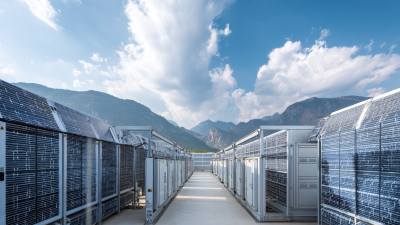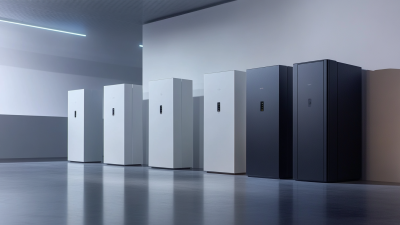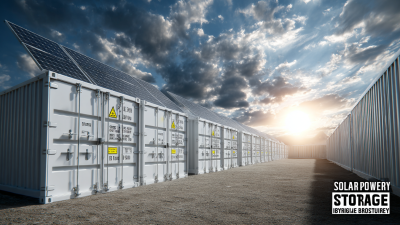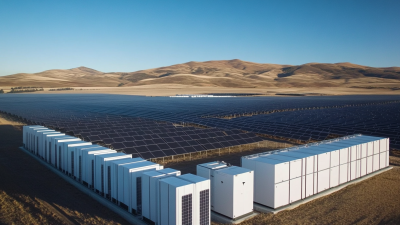As the demand for renewable energy surges, Solar Power Battery Storage has emerged as a pivotal solution to enhance the efficiency and reliability of solar energy systems. According to a report by the International Renewable Energy Agency (IRENA), the global energy storage market is expected to reach a capacity of 1,000 GWh by 2030, significantly driven by advancements in battery technologies. This trend is further fueled by rising electricity prices and increasing energy consumption, making the need for effective storage solutions more urgent than ever. Additionally, a study by BloombergNEF highlights that the cost of lithium-ion batteries has dropped by 89% since 2010, making Solar Power Battery Storage not only a sustainable choice but also a financially viable investment. With these compelling statistics supporting the transition, now is the opportune moment for homeowners and businesses to harness the potential of Solar Power Battery Storage for a cleaner and more independent energy future.

As homeowners increasingly seek energy independence, solar power battery storage emerges as a smart financial investment. By integrating battery storage with solar panels, homeowners can maximize their energy utilization and significantly reduce their reliance on the grid. During peak sunlight hours, excess solar energy can be stored for later use, effectively lowering electricity bills. This means that on cloudy days or during the evening, homeowners can tap into their stored energy, avoiding higher utility rates and potential price spikes.
Moreover, many regions offer financial incentives for adopting solar battery systems, including tax credits and rebates. These financial advantages can considerably offset the initial installation costs, making it easier for homeowners to transition to renewable energy. Additionally, with rising energy prices, the long-term savings from investing in solar power battery storage can lead to a favorable return on investment. Ultimately, choosing solar battery storage not only provides immediate cost savings but also enhances property value, making it an attractive choice for modern homeowners looking to invest wisely in their future.
Energy independence is a driving force behind the growing adoption of solar battery storage systems. By harnessing solar power, homeowners can generate their own electricity and significantly reduce their reliance on the grid. Solar battery storage plays a pivotal role in this equation by allowing individuals to store excess energy produced during daylight hours and utilize it during peak usage times or when the sun isn’t shining. This not only enhances self-sufficiency but also mitigates the impact of fluctuating energy prices and potential power outages.
Moreover, investing in solar battery storage empowers consumers to take control of their energy future. With a reliable backup system in place, individuals can ensure uninterrupted power supply for essential appliances and devices, making them less vulnerable to grid failures. This shift towards energy independence fosters a more sustainable environment by reducing the overall carbon footprint and promoting renewable energy usage.
As the technology advances and costs continue to drop, there has never been a better time to consider solar battery storage as a vital part of your energy strategy.
As the shift towards renewable energy accelerates, solar power battery storage has emerged as a critical component in maximizing the benefits of solar investments. Battery storage systems allow homeowners and businesses to capture excess solar energy generated during the day for use during peak demand hours or at night, ensuring a reliable power supply regardless of sunlight availability. This capability not only enhances energy independence but also optimizes energy consumption, enabling users to reduce their reliance on the grid.
Furthermore, integrating battery storage with solar arrays can lead to significant financial savings. By storing energy during low-cost periods and using it during high-cost periods, consumers can lower their electricity bills and take advantage of time-of-use rates. Additionally, with various incentives and tax credits, the initial investment in solar energy and battery storage can be recouped more quickly, making it a sound financial decision. As energy prices continue to rise, investing in solar power battery storage not only makes environmental sense but is also a proactive step towards achieving long-term cost efficiency and energy security.
As the world grapples with the escalating effects of climate change, transitioning to solar power battery systems emerges as a pivotal strategy for reducing our environmental footprint. By harnessing solar energy, individuals and businesses can significantly decrease their reliance on fossil fuels, which are the primary culprits behind greenhouse gas emissions. Solar battery storage allows for the capture and use of energy generated during sunny days, ensuring that clean energy is available even during peak demand times or adverse weather conditions.
Moreover, solar battery systems promote energy independence, reducing the strain on the grid and minimizing the need for energy production from non-renewable sources. This shift not only curtails air and water pollution associated with traditional energy production but also fosters a more sustainable energy ecosystem. By investing in solar battery storage, we are actively participating in a movement towards a greener future, contributing to cleaner air and a healthier planet for generations to come. The positive environmental impact of these systems is not just a personal benefit but a collective step forward in combating environmental degradation.

When it comes to investing in solar power battery storage, choosing the right solar battery is crucial for maximizing your energy efficiency and savings. There are several types of solar batteries available on the market, including lithium-ion, lead-acid, and flow batteries. Each type has its own advantages and limitations, so it’s essential to understand your energy needs and how each battery performs under different conditions.
Tip: Consider your energy consumption patterns when selecting a solar battery. If you rely heavily on electricity during peak hours, you may want to invest in a battery with a higher capacity and faster charging time. Additionally, think about the battery's lifespan and warranty; a longer lifespan typically indicates better performance over time.

Another important aspect is compatibility with your existing solar system. Not all batteries play well with every inverter or solar panel type. Ensuring that your battery choice is compatible with your equipment will help avoid any costly upgrades later on.
Tip: Research the efficiency ratings of different batteries. A battery with a higher round-trip efficiency will deliver more usable energy, reducing waste and maximizing your investment in solar energy storage.





